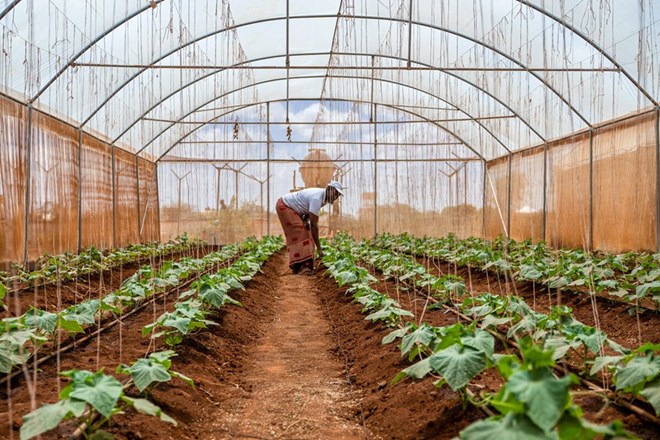
Friday March 14, 2025

A cooperative farm in Barwaaqo Village, Somalia. ©FAO/Arete/Mahad Saed Dirie
Mogadishu (HOL) — Somalia has launched a $79.7 million climate resilience initiative to bolster agriculture and protect communities from worsening climate shocks. The seven-year project, Ugbaad, seeks to restore degraded farmland, improve water access, and enhance climate data systems to mitigate the impact of extreme weather conditions.
Named Ugbaad—a Somali word meaning "fresh sprouting pasture"—the seven-year initiative seeks to rehabilitate degraded farmland, secure water resources, and provide climate data to at-risk communities. The project, funded by the Green Climate Fund (GCF) and spearheaded by the Food and Agriculture Organization (FAO) in collaboration with the Somali government, represents a critical milestone as the country battles the dual threats of environmental collapse and food insecurity.
Agriculture is Somalia's backbone, sustaining nearly two-thirds of the population. Yet, relentless climate shocks—prolonged droughts and catastrophic floods—have plunged millions into acute food insecurity. FAO warns that almost 25 percent of the population faces extreme hunger, a figure set to climb as climate unpredictability worsens.
Recurring droughts wipe out up to 40 percent of livestock in pastoral communities, while frequent flooding along the Jubba and Shabelle rivers has devastated entire villages, displacing thousands. Ugbaad aims to counter these threats through sustainable farming techniques, enhanced irrigation, and disaster mitigation strategies.
A Plan Rooted in Action
The project outlines several transformative measures:
- Restoring more than 40,000 hectares of farmland using community-led conservation techniques.
- Rehabilitating 15 km of irrigation canals and 70 km of rural roads to ensure climate-resilient infrastructure.
- Increasing income by at least 15 percent for 15,000 people through climate-adaptive value chains.
- Providing clean water access to 900,000 people while expanding climate information services to 950,000 individuals.
Henry Gonzalez, Chief Investment Officer at the Green Climate Fund, emphasized the project's urgency: "In this era of escalating climate risk, Ugbaad will empower communities with sustainable farming practices, resilient landscapes, and reliable water access. Our priority is ensuring that vulnerable populations receive the support they need."
The initiative builds upon Somalia's participation in the Green Climate Fund Readiness Programme, which has strengthened the country's ability to access and manage climate finance. By aligning with Somalia's National Transformation Plan, Ugbaad is set to reinforce national research institutions, farmers' associations, and local governance structures to ensure long-term climate resilience.
FAO's Assistant Director-General for Africa, Abebe Haile-Gabriel, underscored the importance of local participation: "The Ugbaad project is about empowering communities to take the lead in climate adaptation. We recognize the challenges on the ground, but we also see an opportunity to drive change from within."
The project, formally launched in February, is now in its consultation phase. An inception workshop scheduled for April will finalize the roadmap for implementation.
Deputy Prime Minister Salah Jama hailed the initiative as a turning point in Somalia’s fight against climate instability: “We are integrating climate action into our National Transformation Plan. Through Ugbaad, we are restoring landscapes, strengthening livelihoods, and building a future where Somalia is no longer at the mercy of climate disasters